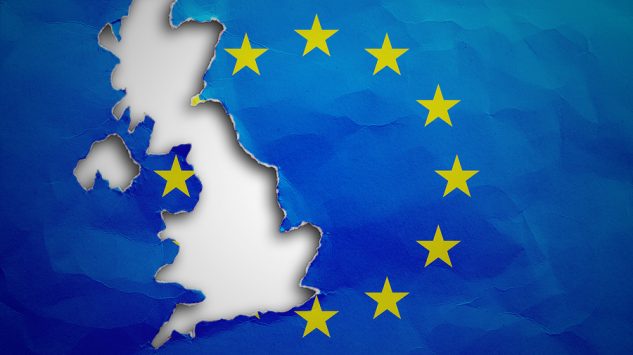Issue Briefs

Britain Needs Hard Money, Hard Brexit
Martin Hutchinson
June 20, 2017
On June 8, Theresa May’s Conservatives came close to losing an election they should have won easily. The commentariat, all of whom like the Brussels bureaucrats and love the Brussels restaurants, claimed she had lost because of her firmness on Brexit and the Tories’ excessive devotion to fiscal austerity. Actually the Tories, not notably devoted to fiscal austerity, lost because they have tolerated the Bank of England’s appalling monetary sloppiness, with its devastating effect on the economy and on house prices. A hard Brexit and hard money are now needed to right the ship.
Bad campaign
May is not a good campaigner, though she has other virtues, and she did not run a good campaign. However, the election result if looked at appraisingly was not a disaster; the Conservatives lost only a net 13 seats, and picked up twelve glorious new seats in Scotland, cementing the Union for at least the next decade or so. Almost all the parts of Scotland one would conceivably like to visit are now Conservative, ending a troubling period when some of the most beautiful places in the world were represented by either socialists or Scottish Nationalists (also in practice socialist.) Aesthetically, one really doesn’t care how Glasgow votes.
There will be a majority
If May had lost another six seats, the result would have been a true disaster as the Conservatives would have been unable to form a government, but she didn’t; with ten staunch Democratic Unionists from Ulster she has a solid majority. Given that seven Sinn Fein MPs will not take their seat and the Speaker does not vote, and assuming the Independent Unionist Sylvia, Lady Hermon votes with the opposition, as do the LibDems, Greens and Nationalists, the vote in a full House vote of confidence would be 327 votes to 315. All May has to do is avoid losing too many by-elections.
Not about Brexit
The reason for the Conservatives’ unexpectedly poor result can be clearly seen when we examine individual constituencies which swung strongly to Labour or unexpectedly to the Conservatives, in an election in which swings differed markedly from region to region and even from seat to seat. One factor alone explains the poor Tory performance and, contrary to media commentary, it is not Brexit, which tended to push voters away from the Conservatives. It is house prices.
Since the middle 1990s, and especially since 2008, the Bank of England has followed an exceptionally loose monetary policy, with interest rates close to zero for almost a decade. This has tracked monetary policy in other countries, notably the United States under Ben Bernanke and Janet Yellen, but also Japan and more recently the Eurozone.
Housing bubble?
The policy, reinforced by Mark Carney since he took over as Bank of England Governor in 2013, has had two unfortunate economic effects everywhere it has been tried. It has caused a massive misallocation of capital, which has pushed productivity growth far below historic levels all over the rich world (less than 0.2% per annum since 2008 in Britain.) Second, and most especially in Britain, it has caused an explosion in house prices to levels completely unaffordable by anybody under 40, or who did not buy their house a quarter-century ago.
Apart from Kensington and Chelsea, surely a special case with average house prices around £2 million, you can look at another London Conservative loss, Croydon Central. Here the average house price was a relatively affordable £380,000 in 2016 – but this was up a full 26% in the preceding two years. The result was a 5.2% swing to Labour and another lost Conservative seat. Again, the problem wasn’t London’s Remain vote; there was a 3% swing to Labour in 2015; it was the excessively high level of house prices compared to incomes, even in scruffy Croydon.
Unaffordable housing pushed voters towards Labour
In 2016 London was a special case in the Brexit referendum, but in 2017 it wasn’t a special case on house prices and electoral swings to Labour. Canterbury, Labour’s most famous seat gain, saw a house price rise of 21% between 2014 and 2016 and a 10% swing to Labour. Brighton Kemptown, another big Labour gain with a 10,000 majority and an 11% swing, saw house prices up 20% between 2014 and 2016.
Bath, a surprise Conservative loss to the Liberal Democrats on a 10% swing, saw house prices rise 23% between 2014 and 2016. In all these constituencies, as a result of the Bank of England’s lunatic monetary policies, house prices had risen by more than 20% in two years, dashing the hopes of younger people for home ownership. No wonder these places saw a massive increase in youth turnout against the Tories.
Conservatives won where people can afford homes
Turn it around, and look at the constituencies where the Tories won from Labour, against the national trend (ignore Scotland, where special factors were at work.) In Mansfield, home of an unexpected Conservative victory with a 7% swing, house prices rose only 10% in 2014-16 – and only averaged an affordable £145,000 in 2016, less than half Bath or Brighton. Stoke on Trent South, with average prices up 12% in 2014-16 to a level 10% below Mansfield, saw another Conservative gain with a 4% swing. Walsall North, slightly more expensive but with only a 6% house price rise in 2014-16, was a Conservative gain with a 6% swing.
In summary, the Conservatives won marginal seats where house prices were modest and price rises equally so; they lost badly to Labour in places where house prices were exorbitant and rapidly getting more so. Exorbitant house prices are almost entirely the result of a decade of near-zero interest rates; to modify a famous Sun headline: “It was Carney who lost it.”
Get the Bank of England to push interest rates up
If May wants the Conservatives to win the next election, she must fire Carney forthwith, and find a Bank of England Governor who will push interest rates up rapidly to their natural level of around 5% (since UK inflation is currently running at 3 %.) That will crash house prices, probably by as much as 75% in London, making housing once more affordable for the under-40s. This will cause a massive pro-Tory swing among younger voters, who will thank the government for their huge improvement in real living standards. It will also restore British productivity growth to its historic level of 1.5% annually, pushing up output and wages for everybody. May or a Conservative successor will need to hang on five years to outlast the inevitable economic downturn and the house price crash, but by 2022 things should be looking good.
Who will negotiate Brexit?
I have previously written how the main criterion for Brexit should be that Britain regains the ability to write its own trade treaties, liberating it from the protectionist EU bureaucracy. When the referendum passed, I thought the best British negotiator would be the smooth and pleasant David Cameron, who if negotiating with the equally pleasant Donald Tusk, should be able to reach a deal satisfactory to both sides. That option is no longer on offer, partly because EU negotiating policy is being set by Michel Barnier, an abrasive Frenchman and Jean-Claude Juncker, whose antipathy to all things Anglo-American is well known.
In addition, Angela Merkel and Emmanuel Macron, the leaders of Europe’s two most important political and economic powers, appear determined to make Brexit as unpleasant for Britain as possible. Therefore May, in her “bloody difficult woman” mode is ideal as Britain’s negotiator, along with the no-nonsense David Davis.
Forget soft Brexit
A “soft” Brexit is neither desirable nor attainable. Juncker in particular is determined to make Britain pay an “exit tax” of some 100 billion euros. Were Britain to agree to this, the government that agreed it would rightly be booted out by the electorate, to be replaced by Jeremy Corbyn, who would crash Britain’s economy.
Overall therefore, an ideal outcome from the Juncker viewpoint. Hence there is probably no negotiated settlement that could be reached, short of electoral suicide. In those circumstances, no deal is indeed better than a bad deal; Britain should exit the EU in March 2019, and seek to negotiate trade agreements with the EU afterwards, when there is no question of an exit tax.
Pay a reasonable exit tax
That’s not to say that there may not be some small part of the 100 billion euros that is legitimate; British lawyers of a suitably euro-skeptic frame of mind should examine the small print of the various treaties, and tell May what if any bill it is reasonable to pay.
The worst possible outcome, which I still fear, would be a British wimp-out, in which its negotiators decide that the cost of exit is simply too high, and so crawl back to Juncker and his minions asking to be let back in again. That would almost certainly be the outcome if May is replaced by the odious, untrustworthy and inept Euro-madman Kenneth Clarke, for example. Armed rebellion should be the response if this is attempted.
EU is not about free trade anymore
We must remember that the EU is not the free trading association Britain thought it had joined in 1973, but has morphed into a centralized unitary state that in authoritarianism and economic counter-productiveness increasingly resembles the late unlamented Warsaw Pact. Fortunately, this should become all too clear within the next few weeks, when Juncker’s mob sues Poland, Hungary and the Czech Republic to force them to take some of the Middle Eastern refugees, terrorists, and riff-raff that Merkel has so unwisely welcomed into Europe. Should that occur, I think it likely that Britain will not be alone in seeking to escape the Euro-Leviathan; it should do all it can to help its Eastern European friends join it in freedom.
No soft option available
The British public appears to have voted on June 8 in search of a soft option, a very common electoral failing in that country. No soft option is available in either economic or Brexit policy that will not impoverish and enslave Britain’s voters. Accordingly, May’s new government must remember Enoch Powell’s famous question to her great predecessor “the Lady herself will learn of what metal she is made” and seek to make both its monetary and Brexit policies follow his post-Falklands description: “ferrous matter of the highest quality, of exceptional tensile strength.”
Only with such policies, monetary and Brexit, can success for the British people and May’s Conservatives be achieved.
 Martin Hutchinson is a GPI Fellow. He was a merchant banker with more than 25 years’ experience before moving into financial journalism. Since October 2000 he has been writing “The Bear’s Lair,” a weekly financial and economic column. He earned his undergraduate degree in mathematics from Trinity College, Cambridge, and an MBA from Harvard Business School.
Martin Hutchinson is a GPI Fellow. He was a merchant banker with more than 25 years’ experience before moving into financial journalism. Since October 2000 he has been writing “The Bear’s Lair,” a weekly financial and economic column. He earned his undergraduate degree in mathematics from Trinity College, Cambridge, and an MBA from Harvard Business School.
This article was originally published on the True Blue Will Never Stain http://www.tbwns.com